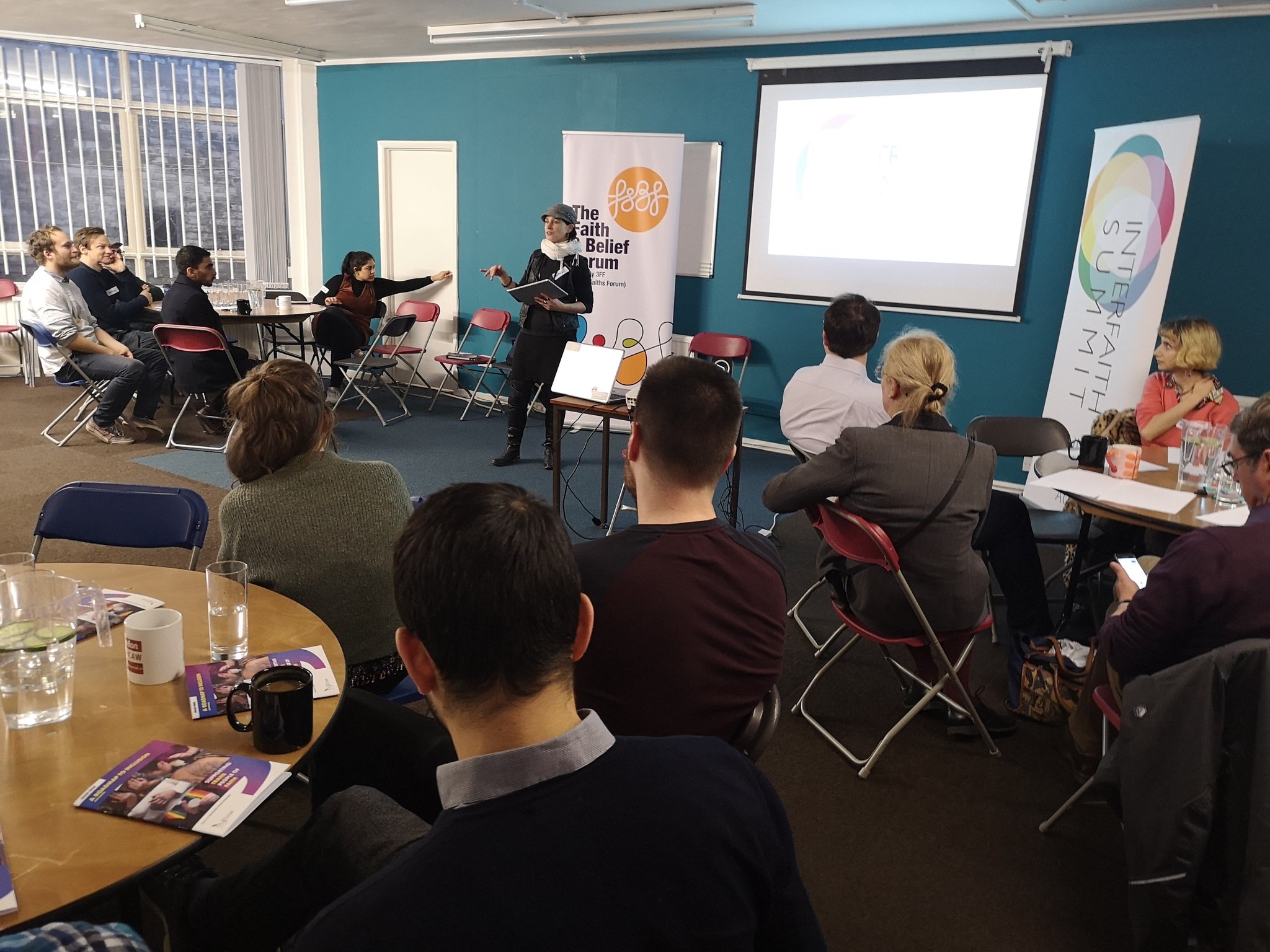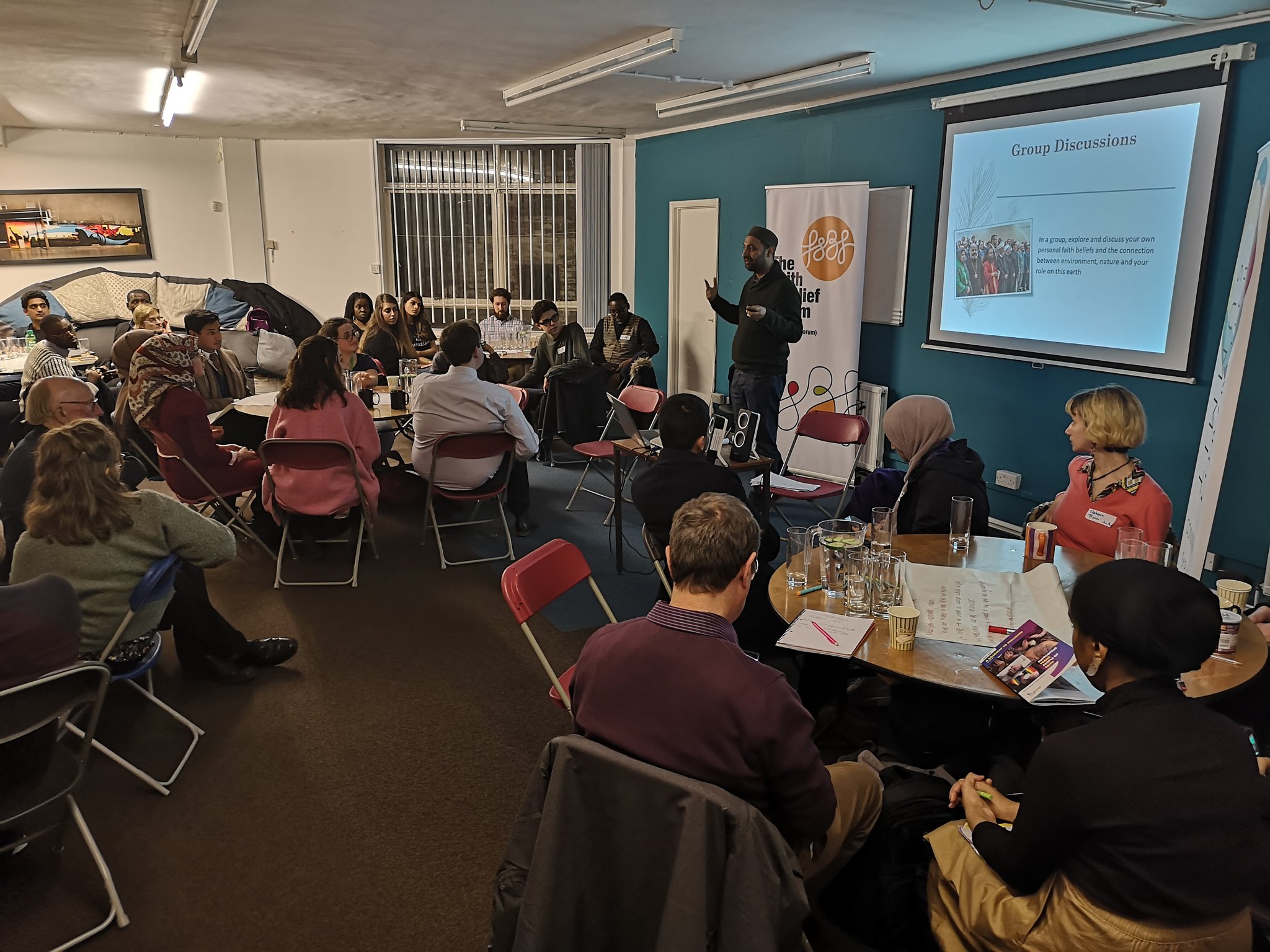The Faith & Belief Forum Interfaith Summit 2020
Context:
The Faith & Belief Forum Interfaith Summit is an initiative established by a group of young volunteers aged 18-25 who graduated from The Faith & Belief Forum’s leadership programme – ParliaMentors. The Summit is an interactive, peer-led space for people of all faiths and beliefs to; connect, explore, and act together.
The aim of this summit is to bring young people together to discuss and engage with contemporary issues under a faith lens. The focus on providing opportunities for youth volunteering has ensured that the summit gives a platform to young voices whilst fostering a sense of social justice with an overarching interfaith theme. The committee for the Interfaith Summit comes from a range of different faith backgrounds, including Greek Orthodox, Hare Krishna, Hindu, Muslim, Church of England, the Church of Jesus Christ of Latter-Day Saints and Jewish backgrounds.
The Summit is about bringing young leaders from different faiths and backgrounds together to learn and understand each other in a different way. One that inspires them to go off and make meaningful change in society. For some attending, it’s the first time they have ever spoken to someone from a different faith but for others it’s a chance to forge new connections for collaboration between different faith communities. It gives them a safe space to air their voice but also to listen to one another.

(Interfaith Summit 2015)
Interfaith Summit 2020 - Initial Stages:
The youth committee decided that the Interfaith Summit would coincide with World Interfaith Harmony Week as this would allow them to stand with their global counterparts in celebrating this week.
With a five-month lead time, the Summit gave the youth committee an opportunity to get to know and collaborate with one another. Each committee member brought different skillsets as well as access to different faith-based networks. As well as delivering the summit all committee members were either in full time employment or further education.
From the beginning, the Interfaith Summit preparation faced major obstacles in the form of funding. The absence of major funding sources meant that the committee had to be innovative and meticulous budgeters if they were going to organise an event that would be of both high quality and cater to a large audience. The 2020 Summit had a total budget equivalent to only one per cent of a previous summit’s budget.
The Summit aims to be topical and relevant, and given the state of current affairs such as the community divisions in a post-Brexit Britain, very much needed. This year the committee chose two arguably most pressing issues– global warming and social justice – each one being addressed under the lens of interfaith relations.
The committee reached out to some of the leading UK charities tackling the contemporary crises and successfully secured support from St Ethelburga’s Centre for Reconciliation and Peace and Faith for the Climate.
Justine Huxley, from St Ethelburga’s facilitated an important discussion on Social Justice. The question of social justice in the UK was explored and discussed in an introspective manner that encouraged groups to discuss questions of excess and moderation in belief.

(St Ethelburga's Justine Huxley giving an interesting session on social justice)
The second session was led by Kamran Shezad from Faith for the Climate who gave an equally interesting talk on climate change. Crucially, he chose to devote his talk to the more pressing matter of action in the face of the climate crisis and specifically action from faith communities. He urged attendees to reflect on the ways in which our religious teachings and values shade our understanding of environment, responsibility and climate change more widely.

(Faith For the Climate's Karman Shezad giving an interesting session on climate change)
Together with our digital campaign to raise awareness about the importance of observing this week, the Interfaith Summit was to be a culmination of all efforts made throughout this week to express the commitment of the younger generation to promoting interfaith harmony.
Impact:
- 45 people from 10 different faith backgrounds attended the Summit from a range of different backgrounds 10 young people formed a committee working over 5 months, with a further 8 volunteers on the night
- 13 civil society organisations supported the event such as:
- The Interfaith Ambassadors from Peterborough City Council
- Birmingham City University
- The Inter Faith Network for the UK
- Kings College London
- Humanist Students
- Blueprint for Free Speech
- Faiths Forum for London
- London School of Economics- Faith Centre
- Coventry University
- Queen Mary University
- University of Leeds Faith Based Regeneration Network
- Nottingham Trent University
200 people engaged with our online campaign
We achieved this in a number of ways: seating arrangements were designed so as to facilitate more collaborative discussion, facilitators regularly called on the audience to reflect in groups about topics they were covering, and the sharing of food and drink allowed for a natural and organic environment in which people from different backgrounds could get to know one another and learn about each other’s perspectives on the issues being covered. Each logistical detail was meticulously planned in order to enable the greatest possible engagement and interaction.
To add to that, although the event was organised and led by a youth volunteer committee, attendees ranged from all ages which allowed for the event to not only embrace interfaith discussions, but also allowed for an exchange of intergenerational perspectives.
The Interfaith Summit encapsulates A Common Word’s Abrahamic ethos of love of God and love of the neighbour through its focus on vicegerency and respect for God’s creations whether that be the environment, animals or the wider community. In addition to this, the emphasis on social justice allowed for attendees to reflect on methods to better the community in ways that are healthy and humane, accentuating the aspiration of viewing the community as a neighbourhood. Furthermore, the attendance of people from a range of different belief backgrounds whether Christian, Muslim, Jewish, Humanist, Atheist, Hare Krishna, Hindu or from other beliefs and worldviews allowed for everyone involved to reflect on the fact that the responsibility to better one’s community does not consider religious, belief or faith differences – working towards a better community is an equal partnership.

Testimonies:
- ‘The summit broadened by mind on topics that I didn’t originally associate with interfaith work and further equipped me to discuss these topics in my community to generate positive change’ – Josephine (Summit Participant)
- ‘The interfaith summit was very insightful as it was the first I ever attended. It was a safe space for everyone to be themselves and embrace his/her faiths and beliefs freely…and interfaith platforms being local, national, or international, should always be encouraged.’ – Iman (Summit Participant)
- 'I felt that in order to help spread the message of interfaith I should get involved in organizing events that aim at bringing people from different religious and non- religious backgrounds together. As for the Summit per se I thought it was necessary to create events that respond to current global issues.' – Ianthi (Volunteer Youth Committee Member)
